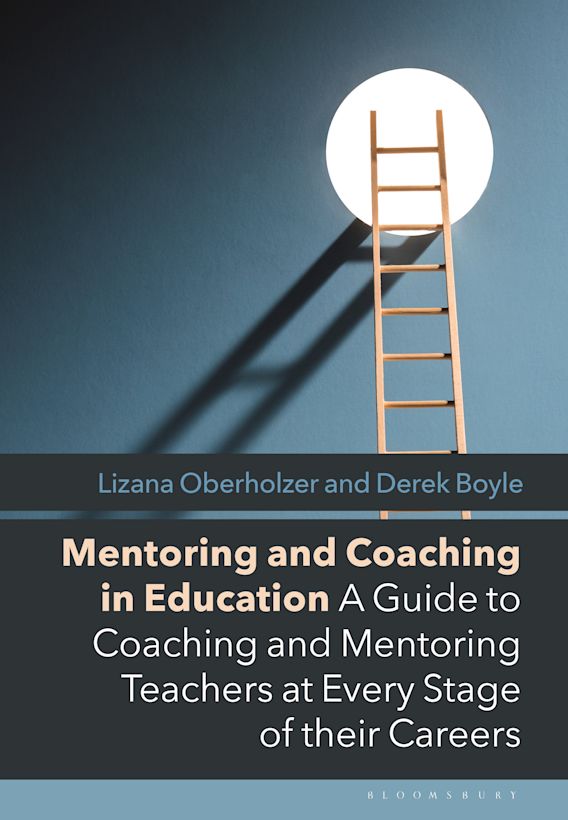Mosaic Book of the Term Prize Draw
Spring 2024

Written by Rob Caudwell, Co-Founder of Penrose Education
29 February 2024
At Penrose Education we are on a mission to fill the (teacher training) world with thoughtfully designed and effective EdTech. But we also want to fill the (teacher training) world with books.
Each term we will be reviewing a book we have found helpful, interesting and/or thought-provoking in our attempts to develop our understanding of what exceptional teacher training looks like.
Best of all – you could win a copy of one of these books in our Book of the Term Prize Draw!
Our chosen book this term is: Mentoring and Coaching in Education: A Guide to Coaching and Mentoring Teachers at Every Stage of their Careers, by Lizana Oberholzer and Derek Boyle.
Why we chose this book?
If you work in ITE in the UK, you are probably currently reviewing or revising your approach to mentoring ahead of the 2024-25 academic year. The most recent DfE ITT reforms come fully into affect in September, many of which directly outline what mentoring “should” look like within an ITE programme. Of course, mentoring already formed a key part of pretty much all ITE programmes before these changes, but the reforms introduced an explicit expectation on ITE providers to “ensure” the quality of mentoring provision being offered to trainee teachers – alongside new requirements around the training of mentors. The DfE have also just announced further changes to ITE and ECF provision, with implications on the role of mentors to support trainee and early career teachers. NPQ providers are increasingly building coaching elements into their course designs. And forms of mentoring and coaching have long played key roles in many approaches to teacher and leadership development outside of more formal training programmes, as a recent Teacher Tapp report on the current state of CPD for teachers has remind us. Mentoring and coaching in teacher education, training and development is not new – but it feels like, currently, there is a particular focus on the roles for mentoring and coaching in education.
"The reality is that all teachers are continuous works in progress, and that is also why it is such a rewarding profession where we continue to learn as collaborative professionals within our learning communities."
- p 46
What we've taken from it
Right from the beginning, the authors are clear that this book has not been written to advocate a particular approach to or style of mentoring and coaching. Instead the book aims to offer cross-cutting advice and tools or frameworks for how to support mentors and coaches – whatever stage of career their mentee/coachee is. This flexible, broad, rich, yet still practical advice for mentor and coach development is the first thing I liked about this book.
"... mentors and coaches need to fully understand the needs of their mentees and coachees, to enable them to draw on their mentoring and coaching toolkit, to utilize the most appropriate strategies and approaches to meet the professional learners' needs."
- p 2
"In this book, the authors do not subscribe to one mentoring or coaching model but argue instead that mentors need to develop an understanding of a wide range of frameworks, strategies and skills, similar to when they support learners in the classroom to ensure that they can draw on these to meet the needs of their mentees in an appropriate way."
- p 15 (Oberholzer and Lofthouse)
There are many different formal structures and methods for mentoring and coaching. In fact we’ve talked about some of them in previous additions of Book of the Term (for example Instructional Coaching, and Practical Theorising). This book is not championing one of these approaches, or offering its own new structure or method. Instead it sets out to offer guidance for mentors and coaches who are engaging in any form of mentoring and coaching. It offers frameworks, models, templates, reflective tasks, strategies, case studies, evidence summaries and recommended reading – all of which are designed to help its reader think more deeply about their role of mentor or coach.
By taking the approach of curating a “toolkit” for mentors and coaches, Oberholzer and Boyle have succeeded in making this book incredibly useful and versatile. Anyone wanting to develop their understanding of and skills in mentoring or coaching would find this book useful – regardless of which career stage/s they might be supporting, which programme/s or external provider/s they have partnered with and which school or setting they work in.
This flexibility, also empowers mentors and coaches to be able to respond to the individuals they are supporting. If we want our mentors and coaches to be able to adapt and tailor their support to the specific needs of their mentees and coachees, we need them to develop a deep, rich understanding of the options available to them. This book helps to do this.
A second takeaway is how important it is to ensure that all involved in mentoring or coaching fully understand the mentoring-coaching spectrum. The central idea behind this ‘spectrum’ is that more novice teachers will generally benefit from more directive support: mentoring. But as they develop their practice, knowledge and confidence, these teachers will increasingly benefit from less- (or non-) directive support in developing their own thinking: coaching. These two categories are not binary, but instead there is often a gradual, complex and nuanced journey from one end of the spectrum to the other over time. The authors’ position is clear, mentors and coaches are better at their roles if they fully appreciate and understand this spectrum.
It could be tempting (especially given the DfE’s recent focus on mentoring in ITT/ECT), for ITE and ECF training providers to focus exclusively on mentoring. However, this book provides a helpful cautionary note: regardless of where a new teacher is in their development, the end goal should always be towards increasing the independence and agency of the mentee. Mentoring is absolutely important, but we shouldn’t want our mentees to become forever reliant on mentoring. Mentors need to understand the full spectrum so that they can identify opportunities (no matter how small) to move away from more directive support and to empower their mentees to begin taking ownership of their own development.
"Encouraging your trainee to engage with self-initiated enquiry will help them to see self-development and their own learning as a holistic continual development process and not a series of skills to show competence in and move on from"
- p 38
On the other hand, it might be equally tempting to assume that once a teacher is out of their first few years in the profession, that they no longer need any mentoring. Again, the authors challenge this. They are clear that even expert professionals might occasionally benefit from support closer to mentoring. Coaches (and mentors) who understand the mentoring-coaching spectrum can better respond to the specific needs of their coachee (and mentee).
"A reflexive mentor is one that considers the emotional impact of their approach to mentoring and the impact that it has on all of those involved and must therefore focus on the holistic development of the mentee, and their practice is research and evidence informed, and they don't just focus on the operational aspects of the role."
- p 105
The third thing that I really appreciated about this book is its focus on holistic care of mentees and coachees. Mentoring and coaching can absolutely create opportunities for powerful professional learning, but the authors are clear that these relationships also (almost inevitably) have emotional and social elements to them as well.
Almost every chapter, has an explicit section on how to consider the well-being of the mentee/coachee wherever they are in their career. The authors fully appreciate that professional competence is not the only thing needed for a long-successful career in teaching or leadership. Success in teaching and leadership is also predicated on making the role of teacher sustainable and compatible with the whole person who is being mentored or coached. This necessarily requires emotional and social considerations too.
The final two chapters take this further, by considering how elements of a mentee’s or coachee’s identity might intersect and interact with their career journey. In these chapters (“Mentoring and Coaching Women in Leadership” and “Mentoring and Coaching BAME Colleauges in Education and into Leadership”), Ali, Oberholzer and Porritt offer further advice and considerations for the holistic development of mentees and coachees.
Ultimately, the best teachers and leaders are going to be the ones that not only survive in the profession, but “flourish”. To create the conditions for this to be possible, we need mentors and coaches who can appropriately incorporate the emotional and social elements of professional development into holistic support and care for their mentees and coachees.
"Coaching and mentoring advocate that we listen to the needs of the individual we support; if we do that well, we provide an opportunity to help someone to flourish and to enjoy teaching and leadership in education as fulfilling careers. In turn, we also ensure that future learners have leaders who are empathetic, kind and supportive and who always strive to meet the needs of every learner."
- p 170
Upcoming Webinar Co-Hosted by the Chartered College of Teaching and Mosaic by Penrose Education
Do Mentors Want to be Mentors? Defining a Rich, Broad, Long-Term Vision for Mentoring in Education
Join Chair Helen Barker (Teacher Assessment Manager at the Chartered College of Teaching), Robert Caudwell (Mosaic Co-Founder) and guest speakers Derek Boyle and Dr Lizana Oberholzer (authors of Mentoring and Coaching in Education: A Guide to Coaching and Mentoring Teachers at Every Stage of their Careers) for a discussion on what a rich, broad, long-term vision of mentoring could look like.
During this interactive session you will have opportunity to ask questions and contribute ideas as we begin defining how mentoring could become a more attractive, better supported, and a fully appreciated element within a holistic approach to teacher development.
Date: Wednesday 27 March 2024 @4pm
Join the discussion in our upcoming #Mentoring themed webinar in collaboration with @CharteredColl as @LO_EduforAll @wlv_uni, Derek Boyle @Bromley_SC & @RobCaudwell @MosaicPenrose explore how the future of mentoring could become more attractive & better supported. #ITE #ITT
— Mosaic | ITE Platform (@MosaicPenrose) February 22, 2024
How Mosaic supports Mentors and Mentoring
The Mosaic platform is a centralised space that ensures a shared understanding (between the mentor, their trainee(s) and the course provider) of everything that is going on in the school and centre underpinned by the provider’s curriculum, creating an easy-to-use space for mentors to track the conversations and targets they set with their trainees and to capture and review trainee progress.
Mentors report back that Mosaic has helped them reduce workload and mentors working with more than one provider using Mosaic can even use a single login to the platform. Furthermore, they will also now be able to access their personal Mentor Training within the same space.
Our goal is to celebrate mentors, their experience and their agency.
How can I win a copy?
We are giving away three copies of Oberholzer and Boyle’s book to anyone working in positions related to teacher education, training and development.
Click the button below to be in with a chance to win.
Entries will close 11:59pm on the 29th of March. We will randomly select the lucky winners on the 8th of April.

